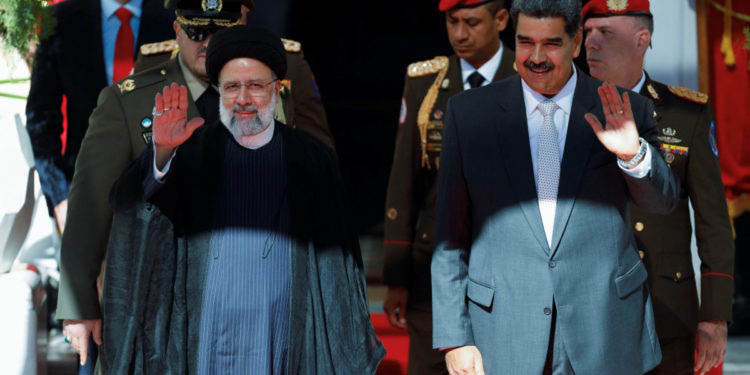CARACAS, (Reuters) – Iran and Venezuela want to increase bilateral trade to $20 billion, up from $3 billion, Iranian President Ebrahim Raisi said yesterday during a visit to Caracas.
During the visit the two countries signed a memorandum of understanding to expand cooperation in petrochemicals with a view to carrying out joint projects, building on their already-close cooperation in oil.
“We have decided to increase the cooperation between the two countries,” Raisi said through translation in a statement with Venezuelan President Nicolas Maduro after the petrochemical deal and a dozen other cooperation deals were signed.
“The goal we have for commercial and economic cooperation, the first step is to take the level of cooperation to $10 billion,” Raisi said. “The next step, we want to take it to $20 billion.”
He provided no time frame on the goal.
The governments, both under U.S. sanctions, provided no details of the petrochemical deal.
Venezuelan state television said the accord between Venezuelan state petrochemical firm Pequiven and its Iranian counterpart would facilitate cooperation in oil exploration and development and assess the possibility of joint projects.
The countries also signed a deal to expand cooperation in mining, but provided no details.
Maduro hailed Raisi’s visit and the two countries’ bilateral relationship and said further deals and investments were on the horizon.
The Caracas visit is the first stop on a Latin American tour by Raisi, who will also travel to Cuba and Nicaragua.
Iran and Venezuela signed a 20-year cooperation plan in Tehran last year, pledging partnership on oil, defense and other issues.
That deal includes repairs to oil refineries in Venezuela, which has the world’s largest crude reserves but has struggled to produce enough gasoline and diesel, leading to intermittent shortages that have forced drivers to queue for hours.
Iran has provided fuel and diluents to convert Venezuela’s extra-heavy crude into exportable varieties and since 2020 has supplied parts for repairs to the refining circuit.
A unit of Iran’s state-owned refiner NIORDC signed a 110-million-euro contract in May 2022 to make repairs at Venezuela’s smallest refinery, El Palito, which has a capacity of 146,000 barrels per day.
Iran is also set to be involved in a modernization project at Venezuela’s largest refinery complex, partly to restore distilling capacity.










